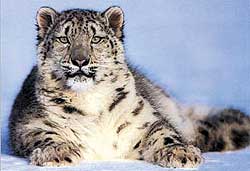 Tigers and rhinos have Chitwan, our wild elephants have Bardia. But where can the snow leopards call home?
Tigers and rhinos have Chitwan, our wild elephants have Bardia. But where can the snow leopards call home?
Lama Karma Sonam Rinpoche has good news: snow leopards are making a comeback in Manang. The monk has been involved in conservation for the past 45 years in the remote Phu village, and his persistence is paying off.
Born in Kham, Eastern Tibet, the rinpoche spent the first 25 years of his life studying and meditating, many of those years near the base of Mt Kailash. Eventually, after the Chinese came into Tibet, Lama Karma's family and 40 other households came to Nepal. En route, all their 70 yaks and 500 goats perished.
In 1959, when the lama first arrived in Manang, blue sheep were rare and the locals had killed off most of the snow leopards to protect their livestock. For years, Lama Karma tried to convince the villagers of Phu that the Buddha teaches respect for all living beings. "All life is interconnected. What comes from the earth must return in a natural way, and killing does not permit this natural progression," he told them. With the snow leopards becoming increasingly rare, Lama Karma announced he would leave Phu for good. Reluctant to part with their guru, the villagers promised not to kill again. They have kept that promise to this day, and both the blue sheep and the snow leopards are back.
 On World Environment Day earlier this month, Lama Karma was invited to Kathmandu by the World Wildlife Fund to receive the prestigious Abraham Conservation Award, which recognises the contribution of dedicated grassroots conservationists. Spinning his prayer wheel steadily, the red-robed 70-year-old priest observed the gathering through his round spectacles, an island of calm in the press of dignitaries.
On World Environment Day earlier this month, Lama Karma was invited to Kathmandu by the World Wildlife Fund to receive the prestigious Abraham Conservation Award, which recognises the contribution of dedicated grassroots conservationists. Spinning his prayer wheel steadily, the red-robed 70-year-old priest observed the gathering through his round spectacles, an island of calm in the press of dignitaries.
Kunjyo Tenzin Lama, a villager and companion to Lama Karma, has no doubt who gets the credit for the return of wildlife in Phu valley. Kunjyo looks on in pride as his guru receives the award. Nodding, he tells us, "It's due to Lama Karma's hard work that the leopards are back. He taught us to respect life in all its forms." (Sraddha Basnyat)


